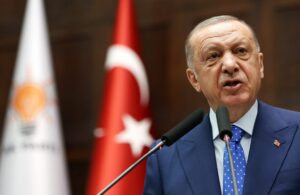The Middle East has been a hotbed of geopolitical tensions, with conflicts often spilling over and affecting neighboring countries. The ongoing strife between Israel and Hamas in the Gaza Strip has not only led to devastating human losses but has also sparked concerns about broader regional repercussions. One such concern voiced by Turkish President Recep Tayyip Erdogan is the possibility of Israel turning its attention towards Turkey once it concludes its operations in Gaza.

Erdogan’s statements, where he warned of Israel’s potential aggression towards Turkey and vowed support for Hamas, have attracted significant international attention and raised questions about the future dynamics in the region. Understanding the context, implications, and potential consequences of such statements is crucial in comprehending the complex web of relationships in the Middle East.
The Root of the Issue: Gaza Conflict and Turkish Support for Hamas
The Gaza conflict, marked by Hamas’s attacks on Israel and subsequent Israeli military operations, has been a longstanding issue in the region. Hamas, designated as a terrorist organization by several countries including Israel, the United States, and the European Union, has garnered support from various quarters, including Turkey. Erdogan’s vocal support for Hamas as a defender of Palestinian rights has been a consistent feature of Turkey’s foreign policy under his leadership.
Erdogan’s recent remarks, where he indicated that Israel could target Turkey following its engagements in Gaza, stem from his concerns about Israel’s military ambitions and the broader regional power dynamics. This raises questions about the potential escalation of tensions and the need for diplomatic efforts to de-escalate the situation.
Analyzing Erdogan’s Warning: Implications and Concerns
Erdogan’s warning about Israel’s possible aggression towards Turkey carries significant implications for regional stability. It reflects growing apprehensions about Israel’s military strategies and the extent to which neighboring countries could be impacted by its actions. The mention of Anatolia, Turkey’s geographical heartland, in Erdogan’s statement underscores the seriousness with which Turkey views the situation.
The potential fallout from any conflict between Israel and Turkey could be catastrophic, not only for the two countries involved but also for the broader Middle East region. It could further exacerbate existing tensions, lead to humanitarian crises, and hamper efforts for peaceful coexistence.
Also Read : Israeli Ambassador Strikes Back at Erdogan’s Gaza Remarks
International Response and Diplomatic Initiatives
The international community has been closely monitoring developments in the region, with calls for restraint and dialogue to prevent further escalation. Diplomatic initiatives aimed at finding a peaceful resolution to the Gaza conflict and addressing underlying grievances have gained traction, although challenges remain.
Efforts to engage in constructive dialogue, promote understanding, and uphold international law are essential in navigating the complexities of Middle Eastern geopolitics. The role of major global powers, regional actors, and multilateral organizations in facilitating dialogue and conflict resolution cannot be understated.
Conclusion: Navigating Uncertainties for Regional Stability
As tensions simmer and rhetoric escalates, the situation in the Middle East remains fluid and unpredictable. Erdogan’s warnings about Israel’s potential targeting of Turkey underscore the fragility of regional dynamics and the urgent need for diplomatic solutions.
International cooperation, adherence to established norms of conduct, and a commitment to peaceful resolutions are paramount in averting further crises and fostering stability in the Middle East. The world watches closely as events unfold, hoping for dialogue and reconciliation to prevail over conflict and confrontation.